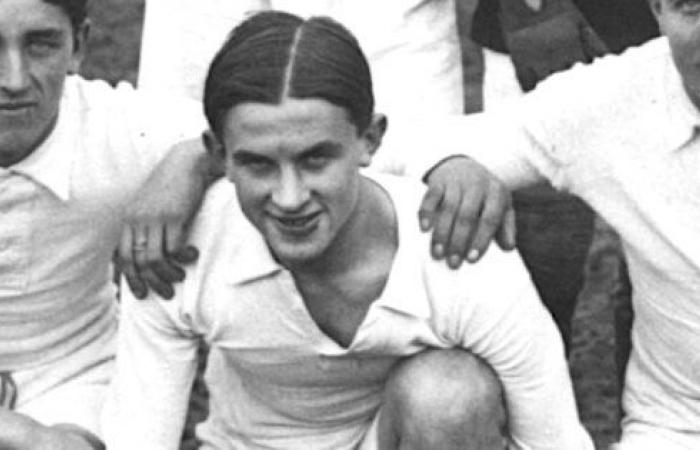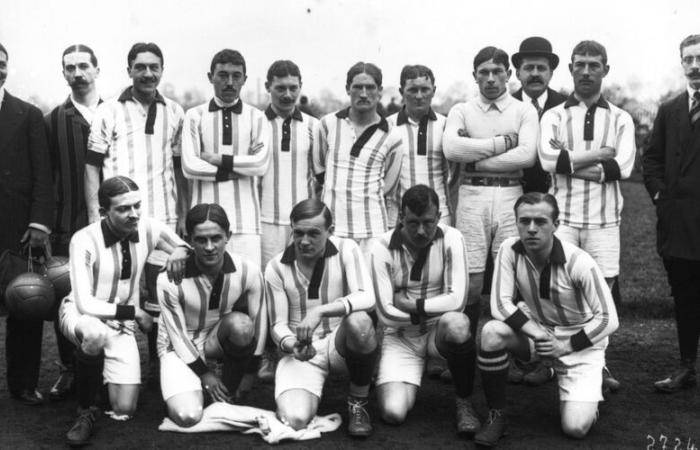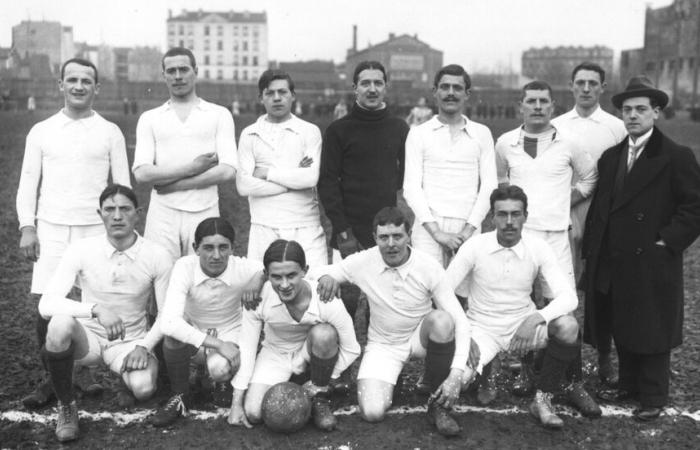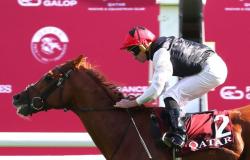André Poullain’s career, three selections in 1913, took place in less than two months, from February 27 to April 20; it is modest, but is characterized, something rare for the time, by two victories (Switzerland 4-1 and Luxembourg 8-0), for a defeat which was not a defeat, against England (1-4) . Indeed, until then England had always scored at least 10 goals to the French team, or even 15, due to its superiority, due to the fact that English football was 40 years older than French football, was indisputable: losing by only three goals was therefore felt as a satisfaction, and, as far as Poullain was concerned, even more so since he scored the French goal.
A team of kids against the CSA
Luckily, Poullain recounted his beginnings in football in Sportingin 1918, and his story plunges us into the golden legend of the pioneers of the early 20th century. Here is what he says: “I was 9 years old, and, in the company of Dartoux and Landauer (who also had careers, without however being official internationals), we had made a paper balloon, tied up as best we could, and we hit it with formidable anger. As for land, we were abundantly provided: the first sidewalk that came along made us happy. One evening, our team of kids went to rue des Rosiers, in Saint-Ouen, where the CSA (Athletic Sports Club) was to play a match, but its opponent did not show up. We offered the CSA to replace him and launched a challenge. He picked him up and we beat him. That same evening, your servant, Dartoux and Landauer signed our membership of the CSA. I was on the second team, then the first the following year. “.
With the CSA, which had joined the LFA in 1910, André Poullain was able to compete against the best Parisian clubs, such as CAP, Red Star or FEC Levallois, and even play gala friendly games in the ranks of Red Star. , alongside Eugène Maës, whom he quickly joined in the selection. Indeed, the CFI, responsible for composing the French team since 1919, only accumulated defeats and needed reinforcements: the membership of the League (as the LFA was called, made up of large Parisian clubs detached from the ‘USFSA) was welcomed with joy and the CFI reserved a place of choice for it in its selection, from 1911.
-
L’Auto of February 28, 1913 (BNF, Gallica)
A 25 meter shot into the top corner against the English
But Poullain, born November 23, 1893 in Paris, did not impose himself. In fact, because of his style, he has always been discussed. He was criticized for his lack of technique, particularly dribbling, which he compensated for with a lot of enthusiasm: he is described as follows: “The ardor, courage personified; terror of goalkeepers. “.
The era preferred “scientific” players, often slow dribblers and passers, and hardly appreciated the go-getters, who hit and played in depth, qualities on the contrary highly prized today. Poullain placed efficiency above style and often shot on goal, including from distance, which did not happen. The end of the game “in the Corinthian style”, model of the English amateur game, was to weave a web of short passes bringing the ball up to 6 meters, or even closer to the goal, before unleashing a shot from close range, necessarily unstoppable.
On the contrary, let’s look at the goal scored by Poullain against these same Englishmen in 1913: “Gueguen passes to Poullain who, from 25 meters away, shoots without hesitation. Bailey (the English goalkeeper Horace Bailey, Olympic champion), poorly placed cannot stop the ball, going to the top of one end of the goals. » Clearly, it is a skylight! An unexpected gesture at the time, a shot not prepared by a clever passing game, but suddenly released from an unusual distance… such was Poullain’s style, which made him the “terror” of goalkeepers…
André Poullain is on his knees, second from the left, on February 27, 1913 in Colombes before France-England (photo agency Rol, BNF Gallica)
A game compatible with that of Eugène Maës
The analysis of the reasons for his selection, in February 1913, is interesting: “The choice of Poullain was generally considered a surprise. This young player certainly does not possess the mastery, but alongside Maës, he proved last season how much he could adapt to the bizarre and neo-classical game of the center forward, having himself, but at a lesser degree, the audacity, the speed, the decision which characterize the navy and white”, that is to say the Red Star players. In short, Poullain was chosen despite his lack of technique because his game matched that of Maës, a center forward different from the classic 2-3-5 center forward, who was a distributor of play positioned behind , while Maës was, like a modern center forward, a point man, a go-getter, a scorer.
The goal that Poullain gives to Maës, against Luxembourg, is in this respect telling: it is a question of a “head” from Poullain, upon receiving an aerial cross from Dubly, which therefore serves as Maës’ header, which score, of the head as well. Clearly, Poullain knocks down an aerial ball from Dubly and transmits it to Maës: nothing less “classic” than this movement, carried out in the air and not at ground level…Poullain is therefore both a scorer and a decisive passer; he also scored his goal against Luxembourg.
Valuable player? Not for purists, and he will be eliminated in 1914, the very classic Henri Bard will be referred to him, and the newspapers justify it by the difference in play: in Poullain the leaguer style, made of passion, of racing, and not of science; in Bard the unionist game, made of passes on the ground, lateral and not vertical. The two men played side by side against the English, and we note this remark: “the difference between unionist and league style was very marked: when Poullain and Bard found themselves side by side, one addressed the ball forward, and the ‘other parallel to its own position. » Poullain sought to serve his center forward, Bard served his winger…. It was Bard who won, in the eyes of the selectors.
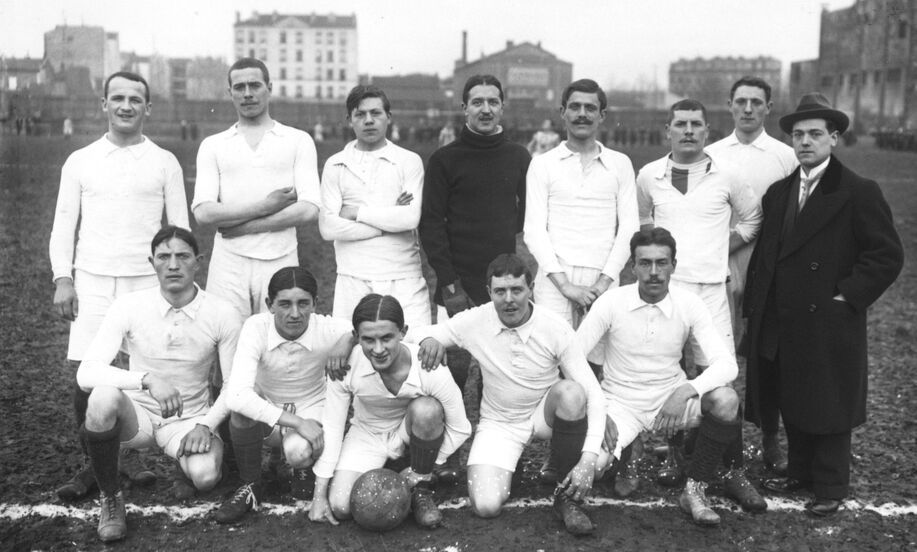
André Poullain crouching in the center with the ball, November 16, 1913 in Saint-Ouen with the CASG (photo agency Rol, BNF Gallica)
Organizer of matches between prisoners near Magdeburg
The War came, and Poullain was taken prisoner very early, at the end of August 1914, and transferred to the Altengrabow camp, near Magdeburg. There he found a group of footballers, including Victor Denis, Henri Lesur, Charles Renaux, and all, of course, set up a team, despite the barbed wire which separated the barracks: “to satisfy our penchant for football, we had chosen a field located at the end of the camp, and very often we had to cross several networks of wire, each of which was guarded by a German sentry” and despite the formal instruction: “prohibition on crossing the wire…” We knows how important football was for the morale of the troops, both combatants and prisoners of war, and Victor Denis, in Footballin 1932, left his own testimony about Altengrabow. According to him, the prisoners formed national teams for France-Belgium, or France-England matches: “We played in red pants, calf bands as stockings, our sweaters replaced jerseys and boots took the place of cleats.” », and the games were often interrupted by the sentries… Football, when you have us!
Three more selections, unofficial, in 1918 and 1919
Sick, Poullain was repatriated, the Germans showing little concern for caring for the sick! This allowed him, not only to return to France, but to play football again, this time at CAP, from 1917. We will see him don the national jersey, but unofficially, against Belgium in 1918 (2- 5), alongside Devaquez and Darques, and his old comrade Dartoux, then participated in the Interallied games of 1919: he beat Romania 4-0, then Italy 2-0, alongside Paul Nicolas, but was injured and will not be able to play the final, lost against Czechoslovakia, replaced by Paul Deydier. It’s the end of the French team for him, 3 unofficial (but prestigious) selections added to the 3 official selections.
Once peace had returned, Poullain played with the CAP, and won the 1920 Coupe de France, beating the HAC (2-1), alongside Henri Bard, and despite their difference in playing style. He had scored in semi-final one goal (against Vie au Grand Air du Médoc, the Bordeaux club) and two goals in the quarter-final at Red Star, proving that he had good remains. Then he left CAP (during its merger with Gallia) and ended his career quietly at AS Française, in 1924.
He died on June 10, 1954 in Noisy-le-Grand.
André Poullain’s 3 matches with the France team
| Sel. | Genre | Date | Lieu | Opponent | Score | Game Time | Notes |
|---|---|---|---|---|---|---|---|
| 1 | Friendly | 27/02/1913 | Doves | England | 1-4 | 90 | 1 but |
| 2 | Friendly | 09/03/1913 | Geneva | Suisse | 4-1 | 90 | |
| 3 | Friendly | 20/04/1913 | Saint-Ouen | Luxembourg | 8-0 | 90 | 1 goal, 1 assist |

